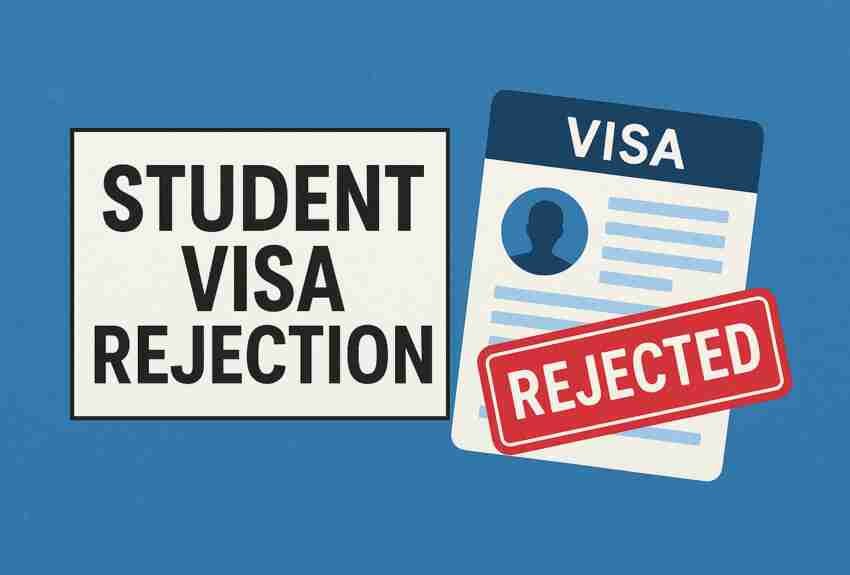
Worried about a student visa application rejection? Learn about the cause of denial and how to reapply successfully, and what to avoid to not get yet another denial. Applying for a visa is critical; you need to focus on minute details. This raises the chances of rejection of the visa application. But your study abroad dream doesn’t end with refusal. In this guide, I’ll answer common problems of visa rejection and what steps to take to bounce back stronger.
Why does the visa officer reject your student visa application?
Visa officers usually reject applications when they:
- Find documents missing or with errors
- Lack of home ties: make them believe you won’t come back to your own country and settle there instead.
- Notices weak financial proof that doesn’t cover tuition and living expenses
- Notices unclear study plans demonstrating no genuine intent to study.
- Sees poor performance with less English proficiency in the interview.
- Finds you getting into a bad university ranking.
- Hears about the plans of working and settling there.
- Detect fraudulent or unverifiable papers.
Make sure you read the rejection letter with attention, as it directly states the reason for refusal.
What should I do right after my application gets denied?
Avoid panicking or reapplying immediately; instead, take these steps:
- Read the rejection letter carefully.
- Identify the specific reason or the missing requirements.
- Reach out to your university’s international student office or a reliable visa consultant.
- Collect the strong essential evidence to ensure against the specified mistakes mentioned in the reason , or the missing documents.
How can I improve my chances when I reapply?
- Put forward accurate and updated valid documents.
- Show plausible financial aid with bank records, provide sponsorship letters, or scholarship documents (if any)
- Present a letter supporting your English proficiency, sound confident, and clear.
- Do mock practice before attending the actual interview.
- Inform a well-structured study plan exhibiting clear dedication towards the field of study.
- Demonstrate strong ties to your home country (such as family, job prospects, or property) so the officer believes you’ll return after your studies.
- Explain the particular motive or resource available that supports your reason to apply to the specific universities.
- Avoid mentioning working in the same country or applauding the country’s work systems while explaining your career plans (because this might appeal to officers that you are interested in working or residing in their country).
- Mention how you would implement the studies for the betterment of your home country, or the companies you are interested in, located in your home country. (This will assure your return)
- Reciprocate that, rejection in the previous application was due to it being your first interview, which made you nervous. If your visa was rejected due to missing documents, state that it was due to a lack of awareness about the documents required.
Can I appeal the rejection?
That depends on the country:
UK: If you are confident that a visa officer has made a mistake or misunderstood, then you can request an administrative review or file an appeal.
USA: The system doesn’t allow appeals. You must reapply with stronger documents and interview preparation.
Canada & Australia: Mostly, you need to reapply, but sometimes you can request a review if you believe there’s an error or an officer has made a mistake.
Always check the official immigration website of the country before deciding on reviews and appeals.
Will the first rejection ruin my future visa chances?
Never. A single rejection will not prevent you from studying abroad. But you need to reply by fixing all the mistakes that occurred in the previous interview, as with every new application, officers might doubt your integrity. Every new application should clearly address the issue from the previous refusal.
Should I think about applying to another country?
Consider this option only after exhausting opportunities in your first-choice country. Other destinations may have simpler visa processes, but the key factor is whether the university and country align with your long-term study and career goals.
Do I really need professional help for the second application?
Many students aren’t aware of every correct process and succeed with the help of a consultancy. Professional helpers provide step-by-step guidance with all the right information about universities to narrow down to what is suitable for you, and guide you with suitable financial aids that match your country choices. Help you discover and apply to scholarships with all the necessary visa guidance from preparation to documentation.
What’s the one thing I should remember after a rejection?
A student visa rejection isn’t the end of your study abroad journey. Think of it as feedback. If you correct the mistakes, strengthen your documents, and prepare confidently, ask for professional help, and you can absolutely get your visa approved on your next attempt.
